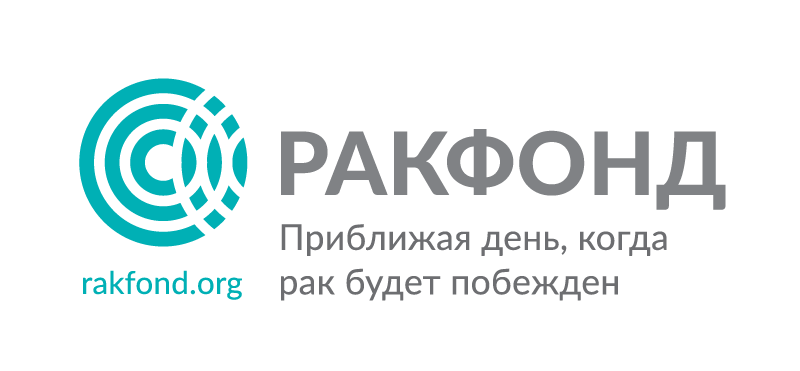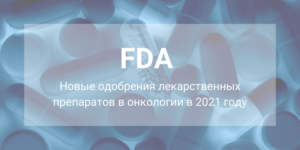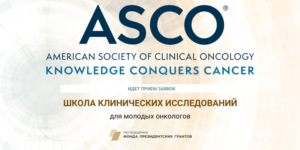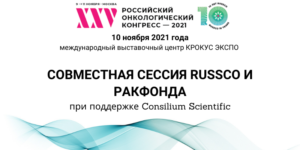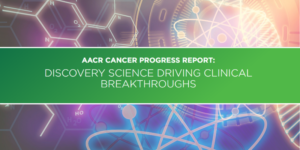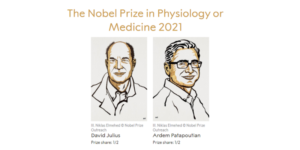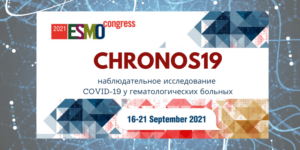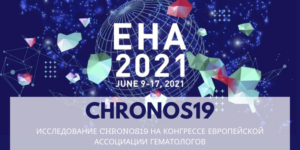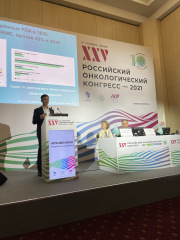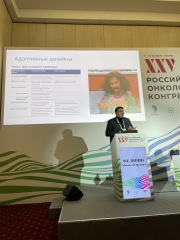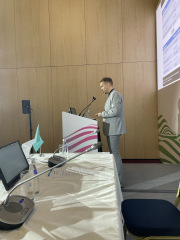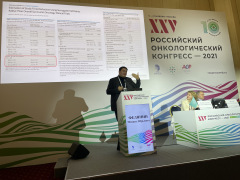The Foundation for Cancer Research Support (RakFond)
About the Foundation
The Foundation for Cancer Research Support (RakFond) is a non-profit organization with the main objectives of:
- funding R&D activities and the development of new methods and tools for the prevention, diagnosis and treatment of cancer;
- promoting the advancement of research activities of scientific institutions, centers, oncological hospitals, and individual specialists in the field of oncology.
The Foundation was founded in 2017 and operates in the Russian Federation.
Support our Work! RakFond’s StrategyNews
Articles and Reviews
- ANNUAL CANCER PROGRESS REPORT ISSUED BY THE AMERICAN ASSOCIATION FOR CANCER RESEARCHDISCOVERY SCIENCE DRIVING CLINICAL BREAKTHROUGHS The American Association for Cancer Research (AACR) released its annual Cancer Progress Report, which highlights advances over the past 12 months in the prevention, detection,… Read more: ANNUAL CANCER PROGRESS REPORT ISSUED BY THE AMERICAN ASSOCIATION FOR CANCER RESEARCH
- ASCO’s Clinical Cancer Advances 2021 ReportASCO’s Clinical Cancer Advances annual report highlights current trends in the field and identifies cancer research priorities that have great potential to advance progress against cancer. The 16th edition of… Read more: ASCO’s Clinical Cancer Advances 2021 Report
- CHRONOS19 WILL BE PRESENTED AT THE EHA 2021 VIRTUAL CONGRESSThe results of the subgroup analysis of the CHRONOS19 registry in patients with acute leukemia and COVID-19 will be presented orally by the study PI Olga Gavrilina, MD, PhD, at… Read more: CHRONOS19 WILL BE PRESENTED AT THE EHA 2021 VIRTUAL CONGRESS
- Bright scientific events in oncology in 2020Author: Alexey Tikhonov 2020 was marked by a large number of striking events in the oncology field, and in this material, I would like to highlight a number of studies… Read more: Bright scientific events in oncology in 2020
- CHRONOS19: INTERIM ANALYSIS OF THE OBSERVATIONAL STUDY OF COVID-19 IN PATIENTS WITH BLOOD DISEASESThe emergence of a new infectious disease COVID-19 led to the extensive research of not only the coronavirus itself, but also the course of this disease in different patient populations.… Read more: CHRONOS19: INTERIM ANALYSIS OF THE OBSERVATIONAL STUDY OF COVID-19 IN PATIENTS WITH BLOOD DISEASES
- Loss of Heterozygosity in the Short Tandem Repeat (STR) Loci Found in Tumor DNA of De Novo Diagnosed ALL Patients As a Factor Predicting Poor Outcome: Interim Results Of The StudyThis study was supported by RakFond, Grant No. 5/2019 KEY WORDS: Loss of heterozygosity (LOH), de novo diagnosed ALL, chromosome aberration, hidden chromosomal abnormalities, uniparental disomy Introduction Acute lymphoblastic leukemia… Read more: Loss of Heterozygosity in the Short Tandem Repeat (STR) Loci Found in Tumor DNA of De Novo Diagnosed ALL Patients As a Factor Predicting Poor Outcome: Interim Results Of The Study
- PLATINUM-BASED CHEMOTHERAPY IN TREATMENT OF PATIENTS WITH PLATINUM-RESISTANT RECURRENT OVARIAN CANCEROvarian cancer is one of the most sensitive tumors to chemotherapy – in most cases it is possible to achieve complete tumor regression affected by modern drug treatment. Unfortunately, despite… Read more: PLATINUM-BASED CHEMOTHERAPY IN TREATMENT OF PATIENTS WITH PLATINUM-RESISTANT RECURRENT OVARIAN CANCER
- Annual cancer progress report issued by the American association for cancer researchTurning science into lifesaving care The American Association for Cancer Research (AACR) released its annual Cancer Progress Report, which highlights advances over the past year in the prevention, detection, diagnosis,… Read more: Annual cancer progress report issued by the American association for cancer research
- Highlights of 2020 ASCO Annual MeetingThis year the American Society of Clinical Oncology (ASCO) Annual Meeting was delivered in a new virtual format on May 29-31, 2020 with a record-breaking attendance of more than 42,700… Read more: Highlights of 2020 ASCO Annual Meeting
Interviews with Experts
RakFond’s experts talk in their short interviews about their choice to become an oncologist, which cancer research they could name as their favorite, and why cancer research support is important.
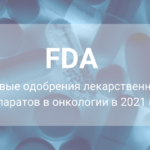
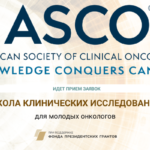
The American Society of Clinical Oncology (ASCO) is partnering with RakFond on the “Clinical Trial Workshop for Young Investigators,” which will be held on February 2-4, 2022, in Moscow, Russia. ASCO will assist in the program development and provide faculty for the joint session. The event also has been included in the ASCO event calendar.
The call for proposals is now open to young investigators who would like to participate in the workshop. More details, terms, and application forms are available at the event web page: https://www.rakfond.org/школа/.
We look forward to receiving exciting proposals and having a productive workshop that will advance clinical cancer research in Russia.
The review of the applications for the Competition of research projects in oncology (RFP 2021-01) has been completed. Overall, 17 full applications were received, 14 of them passed the formal compliance check and were sent for a scientific review.
The maximum weighted score in this competition was 33. The rating of the applications based on the results of the scientific review is presented below. Detailed information on the winner and the project is posted on our website in the Supported Research section.
| 2021-01-08 | 30.56 |
| 2021-01-14 | 28.00 |
| 2021-01-03 | 26.00 |
| 2021-01-06 | 25.33 |
| 2021-01-01 | 24.33 |
| 2021-01-05 | 21.58 |
| 2021-01-07 | 20.00 |
| 2021-01-15 | 19.50 |
| 2021-01-10 | 19.17 |
| 2021-01-11 | 17.67 |
| 2021-01-04 | 17.00 |
| 2021-01-09 | 16.83 |
| 2021-01-17 | 15.17 |
| 2021-01-12 | 13.00 |
In order to protect the personal data of the participants, as well as the confidentiality of the proposals, personal data and other confidential information related to the competition are excluded from open access.
We will be happy to provide more detailed information on the competition, as well as on the procedure for carrying out project evaluations to all interested parties. Please send us a request to the following email: grant@rakfond.org
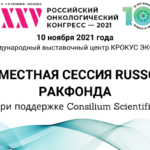
Joint Session of RUSSCO and RakFond with Consilium Scientific
PRESENT AND FUTURE OF ONCOLOGY
Chairs:
- Dr. Nikolay Zhukov, D. Rogachev National Medical Research Center for Pediatric Hematology, Oncology, and Immunology, Moscow>
- Prof. Tatiana Semiglazova, N.N. Petrov National Medical Research Center for Oncology, Saint Petersburg
08:50-09:00 – Introduction
Dr. Nikolay Zhukov, D. Rogachev National Medical Research Center for Pediatric Hematology, Oncology, and Immunology, Moscow
09:00-09:10 – Introduction
Prof. Tatiana Semiglazova, N.N. Petrov National Medical Research Center for Oncology, Saint Petersburg
09:10-09:30 – Cancer morbidity and mortality in Russia in 2035
Dr. Ilya Tsimafeyeu, Kidney Cancer Research Bureau, Moscow
09:30-09:35 – Questions
09:35-09:55 – The limits of personalized cancer medicine
Prof. John Hickman, The University of Manchester, UK
09:55-10:00 – Questions
10:00-10:20 – Drug Repurposing in Oncology – From Candidate Selection to Clinical Investigation
Dr. Pan Pantziarka, Anticancer Fund, Belgium
10:20-10:25 – Questions
10:25-10:45 – Novel clinical trial designs
Dr. Mikhail Fedyanin, N.N. Blokhin National Medical Research Center for Oncology, Moscow
10:45-10:50 – Questions
10:50-11:05 – New approaches in drug approval regulations
Dr. Dmitry Ovchinnikov, Moscow
11:05-11:10 – Questions
11:10-11:25 – New models of funding cancer research and development
Dr. Kristina Zakurdaeva, RakFond, Moscow
11:25-11:30 – Questions
Registration and program of the congress: https://rosoncoweb.ru /.
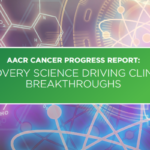
DISCOVERY SCIENCE DRIVING CLINICAL BREAKTHROUGHS
The American Association for Cancer Research (AACR) released its annual Cancer Progress Report, which highlights advances over the past 12 months in the prevention, detection, diagnosis, and treatment of cancer. Below is a brief summary of this report.
CANCER IN 2021
- • According to the latest estimates from World Health Organization (WHO), cancer was the first or second leading cause of death before the age of 70 in 112 out of 183 countries in 2019 and accounted for nearly 10 million deaths worldwide in 2020.
• The age-adjusted overall U.S. cancer death rate declined by 31% from 1991 to 2018, a reduction that translates into 3.2 million cancer deaths avoided. This reduction is driven in large part by the rapid declines in the death rates from aggressive tumors, such as lung cancer and melanoma, over the last decade.
• Implementation of nationwide public education campaigns, as well as comprehensive tobacco control policies, has resulted in a significant decrease in the U.S. smoking rates from 37.4% in 1971 to 14% in 2019. During 2011–2017, nearly 10% more Americans were surviving five years or longer after lung cancer diagnosis compared to 1975–1977.
• The sharp decline in lung cancer deaths in the last two decades also parallels the unprecedented pace of discoveries in basic and translational research leading to clinical breakthroughs against lung cancer: in 2010, there were only 3 FDA-approved molecularly targeted therapeutics; as of July 31, 2021, 30 agents – molecularly targeted therapeutics and immune checkpoint inhibitors – have been approved by FDA to treat various subtypes of lung cancer.
• Rapid advances in the field of molecularly targeted therapeutics and immunotherapeutics have improved the outcomes for patients with several cancer types beyond lung cancer.
• The U.S. 5-year relative survival rate for all cancers combined has increased from 49% for people diagnosed in the mid-1970s to 70% for those diagnosed from 2013 to 2017.
• This trend is also seen among U.S. children and adolescents (ages 0 to 19), for whom the 5-year relative survival rose from 63% to 84% over the same time interval.
• However, there are still no effective treatments for many of the over 200 known types of cancer which desperately require further research and development.
• For those diagnosed between 2011 and 2017, there are striking differences between 5-year relative survival rates for breast (female) cancer (90%) and melanoma (93%) compared to pancreatic (11%) and liver (20%) cancers.
• Cancer patients in the United States paid $5.6 billion out of pocket for cancer treatments in 2018, which is nearly the same as the total $6 billion NCI funding for cancer research that year. Furthermore, an estimated $200.7 billion of total U.S. health care was spent on cancer-related health care in 2020.
• While the Coronavirus Disease 2019 (COVID-19) has adversely affected all aspects of cancer research and care, scientists have responded in new and innovative ways to address the unique challenges posed by the pandemic.
• There are serious concerns about the higher burden of COVID-19 for patients with cancer. Multiple studies indicate that cancer patients are at a greater risk of COVID-19 infection and mortality. This risk is the highest for patients with lung cancer and hematological malignancies and among patients from certain underserved population groups.
UNDERSTANDING HOW CANCER DEVELOPS
- • Research provides our understanding of the biology of cancer, which is not one disease, but a collection of diseases characterized by the uncontrolled growth of cells.
• Genetic mutations underpin cancer initiation and development in most cases; in about 10% of patients, tumor cells contain inherited mutations.
• Cancer initiation and progression are strongly influenced by interactions among cancer cells and cellular and molecular factors in their environment, referred to as the tumor microenvironment.
• Each person’s cancer is unique and so is the response to treatments; understanding why certain patients respond exceptionally well to treatments that are not effective for others is an elusive question in cancer medicine and an area of extensive ongoing investigation.
• The more we know about the contributions of the numerous individual genetic and other factors and their interplay in influencing cancer development among all populations, the more precisely and effectively we can prevent, diagnose, and treat cancer.
PREVENTING CANCER: IDENTIFYING RISK FACTORS
- • In the US, 4 out of 10 cancer cases are associated with preventable risk factors.
• Not using tobacco is one of the most effective ways a person can prevent cancer.
• Nearly 20% of U.S. cancer diagnoses are related to excess body weight, alcohol intake, poor diet, and physical inactivity.
• Many cases of skin cancer could be prevented by protecting the skin from ultraviolet radiation from the sun and indoor tanning devices.
• Nearly all cases of cervical cancer, as well as many cases of head and neck and anal cancers, could be prevented by HPV vaccination, but more than 41% of U.S. adolescents have not yet received the recommended doses of the vaccine.
• The mechanisms by which certain risk factors such as obesity, unhealthy diet, and physical inactivity increase cancer incidence are currently under investigation.
SCREENING FOR EARLY DETECTION
- • Breakthroughs in understanding how cancer develops and progresses are facilitating the development of cancer screening tests that can detect cancer at its earliest stage before it has spread to other sites.
• Technological advances, such as state-of-the-art DNA sequencing methods, minimally invasive biopsies, artificial intelligence, and cutting-edge imaging are poised to transform early detection in the coming years.
DISCOVERY SCIENCE DRIVING CLINICAL BREAKTHROUGHS
- • Genetic and epigenetic characteristics of cancer cells, unveiled by discovery science, are being leveraged to develop novel and innovative treatments for cancer that are saving and improving lives.
• From August 1, 2020 to July 31, 2021, FDA has approved 16 new anticancer therapeutics that include a revolutionary therapeutic against an altered form of the long intractable protein, KRAS, for certain patients with lung cancer, and the first adoptive cell therapy to treat patients with multiple myeloma.
• During the same period, FDA has expanded the use of 11 previously approved anticancer therapeutics to treat additional cancer types, bringing the promise of research-driven clinical breakthroughs to more patients.
SUPPORTING CANCER PATIENTS AND SURVIVORS
- • As of 2019, more than 5% of the U.S. population is living with a history of cancer.
• Each person diagnosed with cancer faces a unique set of challenges; 25% of cancer survivors report poor physical health and 10% report poor mental health, both adversely affecting quality of life.
• Researchers are exploring ways to utilize healthy behaviors, palliative care, psycho-oncology, and other evidence-based strategies to improve survival and quality of life for patients with cancer.
LOOKING TO THE FUTURE
- • The next generation of technologies will accelerate the pace of understanding of cancer biology while transforming the future of clinical practice.
• Combining genomic and proteomic approaches in cancer research will revolutionize treatment by expanding precise use of existing therapeutics and addressing some of the most elusive questions in cancer such as treatment resistance.
• Artificial intelligence holds enormous promise in cancer science and medicine and may transform the future of cancer detection, diagnosis, treatment, and drug discovery.
• The new wave of innovation in science and technology is providing necessary tools to effectively target cancer-driving molecules that have long been “undruggable.”
• Implementation science aims to integrate proven, effective interventions into routine health care in order to bridge the gap between evidence and clinical practice.
In conclusion, the extraordinary advances against cancer detailed in this report were made possible by the dedicated efforts of a broad coalition of researchers, clinicians, cancer survivors, patient advocates, and policy makers.
Decades of investment in medical research have fueled new discoveries, making it possible to prevent, detect, diagnose, treat, and cure many types of cancer that previously lacked effective treatment options. Despite this progress, much more work needs to be done on behalf of those living with cancer and those who will be diagnosed in the future. Continued investments are required to bring lifesaving cures to the millions of people worldwide whose lives are touched by cancer.
Source: cancerprogressreport.org. Philadelphia: American Association for Cancer Research; 2021 [cited October 14, 2021].
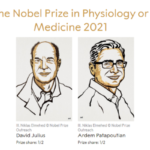
David Julius and Ardem Patapoutian were awarded the Nobel Prize in Physiology or Medicine in 2021. Their discoveries were focused on TRP-ion channels, the receptors responsible for heat and cold, and PIEZO-ion channels, the receptors for touch, which are also involved in sensing body position. The signal activation of ion channels that will subsequently be perceived by the brain makes these receptors vital for our survival.
The study of ion channels, “sensors” of physiological state, helps to better understand the mechanisms responsible for pain, the transmission of pain impulses. Research by Dr. Julius and Dr. Patapoutian deepens our basic knowledge in this area, and can also be used in the development of methods for the treatment of various diseases, including chronic pain syndrome, which is often found in cancer patients.
More effective relief of chronic or neuropathic pain will significantly increase patients’ quality of life, therefore, such discoveries help to advance the day when cancer is defeated.
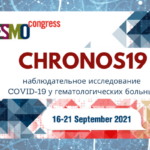
This year’s meeting of the European Society for Medical Oncology (ESMO) took place online on September 16-21. In frames of the scientific program, a poster on the treatment outcomes and antibody immunity to SARS-CoV-2 in patients with hematological malignancies was presented by CHRONOS19 investigators.
A full abstract can be found here: https://oncologypro.esmo.org/meeting-resources/esmo-congress-2021/treatment-outcomes-and-antibody-immunity-to-sars-cov-2-in-patients-with-hematological-malignancies
